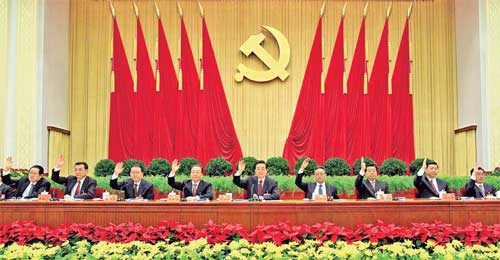Government and Policy
Growth plan mapped out as Party pledges reforms
(China Daily)
Updated: 2010-10-19 06:48
 |
Large Medium Small |
 Members of the Standing Committee of the Political Bureau of the Communist Party of China Central Committee present at the Fifth Plenary Session of the 17th CPC Central Committee, which concluded on Monday, Oct 18, 2010, in Beijing. The meeting elected Xi Jinping as vice-chairman of the CPC's Central Military Commission. [Photo/Xinhua] |
BEIJING - China must make "major breakthroughs" in economic restructuring and maintain stable and relatively fast economic growth, as well as advance "vigorous but steady" political reform, Communist Party of China (CPC) leaders have said.
Hu Jintao, general secretary of the CPC Central Committee, delivered a work report at the four-day Fifth Plenary Session of the 17th CPC Central Committee, which concluded on Monday.
"Great impetus will be given to economic restructuring, while vigorous yet steady efforts shall be made to promote political restructuring," said a communique issued at the end of the meeting.
The plenum appointed Vice-President Xi Jinping as vice-chairman of the CPC's Central Military Commission.
The period from 2011 to 2015 is a critical stage for China to build a moderately prosperous society, and the country aims to maintain "stable and relatively fast economic growth" during those years, according to the communique.
But it is also a time of challenge in deepening the reform and opening-up process and accelerating the transformation of the nation's economic development pattern, it said.
In the coming years, the economy is forecast to grow by about 50 percent to $7.5 trillion, powering past Japan and moving closer to the world's biggest economy, the United States, according to Reuters.
But Peng Sen, deputy director of the National Development and Reform Commission (NDRC), the country's top economic planner, said systematic restraints had frustrated the progress of China's economic development.
NDRC Director Zhang Ping said the key to shoring up economic growth is stronger social welfare and cheaper housing.
"Expanding domestic demand is the guiding long-term strategy of our country's economic and social development," Zhang told the Monday edition of the Study Times.
Zhang said changes needed to secure growth included the further freeing up of resource prices, raising welfare spending to encourage citizens to spend more, increasing the income of ordinary workers and providing cheaper housing.
The communique said that the share of personal income, as part of the distribution of national income, should be increased in the following five years.
Improving basic public services will also be a key task for China over the next five years, it added.
Building a comprehensive service structure would help improve people's lives, should cover urban and rural areas, and promote equal, basic public services, it said.
The document also calls for strengthening the social security system as well as accelerated reform and development of the healthcare sector.
Chi Fulin, head of the Hainan-based China Institute for Reform and Development, said the establishment of more public services and a public service-oriented government will lay the foundation for boosting domestic demand.
"It is important for the government to turn itself into a public service-oriented institution and achieve social justice," he said.
Improved public services could lead to a better market environment so the government could rid itself of redundant, administrative procedures and focus on the promotion of social justice, he added.
The meeting also endorsed a decision to expel 57-year-old Kang Rixin, the former general manager of China National Nuclear Corporation (CNNC), from the CPC Central Committee.
The decision was made by the Political Bureau of the CPC Central Committee on Dec 29, 2009.
Kang had been a member of the CPC Central Committee since October 2007.
Xinhua - China Daily



